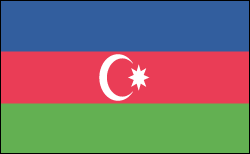Azerbaijan | Facts & Information

- Azerbaijan Profile
- History
- News and Current Events
Infoplease has everything you need to know about Azerbaijan. Check out our country profile, full of essential information about Azerbaijan's geography, history, government, economy, population, culture, religion and languages. If that's not enough, click over to our collection of world maps and flags.
Facts & Figures
-
Republic of Azerbaijan
President: Ilham Aliyev (2003)
Prime Minister: Artur Rasizade (2003)
Land area: 33,436 sq mi (86,600 sq km); total area: 33,436 sq mi (86,600 sq km)
Population (2014 est.): 9,686,210 (growth rate: 0.99%); birth rate: 16.96/1000; infant mortality rate: 26.67/1000; life expectancy: 71.91
Capital and largest city (2011 est.): Baku, 2.123 million
Other large cities (2004 est.): Ganja, 303,000; Sumgait, 280,500
Monetary unit: Manat
National Name: Azarbaycan Respublikasi
Languages: Azerbaijani (Azeri) (official) 92.5%, Russian 1.4%, Armenian 1.4%, other 4.7% (2009 est.) (Source)
Religions: Muslim 93.4%, Russian Orthodox 2.5%, Armenian Orthodox 2.3%, other 1.8% (1995 est.). Note: religious affiliation is still nominal in Azerbaijan; percentages for actual practicing adherents are much lower
National Holiday: Founding of the Democratic Republic of Azerbaijan, May 28
Literacy rate: 99.8% (2010 est.)
Economic summary: GDP/PPP (2013 est.): $102.7 billion; per capita $10,800. Real growth rate: 5.8%. Inflation: 2.4%. Unemployment: 6% official rate (2013 est.). Arable land: 21.78%. Agriculture: cotton, grain, rice, grapes, fruit, vegetables, tea, tobacco; cattle, pigs, sheep, goats. Labor force: 4.68 million (2012 est.); agriculture and forestry 38.3%, industry 12.1%, services 49.6% (2008). Industries: petroleum and natural gas, petroleum products, oilfield equipment; steel, iron ore; cement; chemicals and petrochemicals; textiles. Natural resources: petroleum, natural gas, iron ore, nonferrous metals, alumina. Exports: $34.46 billion (2013 est.): oil and gas 90%, machinery, cotton, foodstuffs. Imports: $10.72 billion (2013 est.): machinery and equipment, oil products, foodstuffs, metals, chemicals. Major trading partners: Italy, Israel, Turkey, France, U.S., India, Russia, China, Germany, Indonesia, Ukraine, Thailand, UK (2006).
Communications: Telephones: main lines in use: 1.734 million (2012); mobile cellular: 10.125 million (2012). Broadcast media: 3 state-run and 1 public TV channels; 4 domestic commercial TV stations and about 15 regional TV stations; cable TV services are available in Baku; 1 state-run and 1 public radio network operating; a small number of private commercial radio stations broadcasting; local FM relays of Baku commercial stations are available in many localities; local relays of several international broadcasters had been available until late 2008 when their broadcasts were banned from FM frequencies (2010). Internet hosts: 46,856 (2011). Internet users: 2.42 million (2009).
Transportation: Railways: total: 2,918 km (2011). Highways: total: 59,141 km ; paved: 29,210 km; unpaved: 29,931 km (2011). Ports and harbors: Baku (Baki). Airports: 37 (2013).
International disputes:Azerbaijan, Kazakhstan, and Russia ratified the Caspian seabed delimitation treaties based on equidistance, while Iran continues to insist on a one-fifth slice of the sea; the dispute over the break-away Nagorno-Karabakh region and the Armenian military occupation of surrounding lands in Azerbaijan remains the primary focus of regional instability; residents have evacuated the former Soviet-era small ethnic enclaves in Armenia and Azerbaijan; local border forces struggle to control the illegal transit of goods and people across the porous, undemarcated Armenian, Azerbaijani, and Georgian borders; bilateral talks continue with Turkmenistan on dividing the seabed and contested oilfields in the middle of the Caspian.









